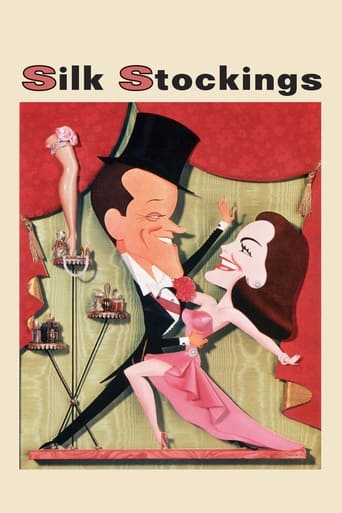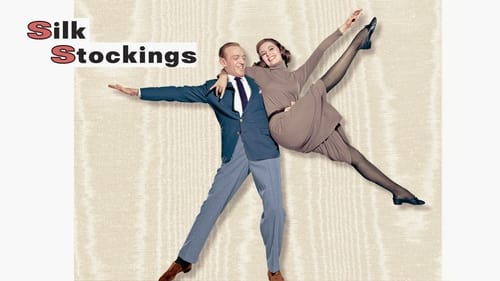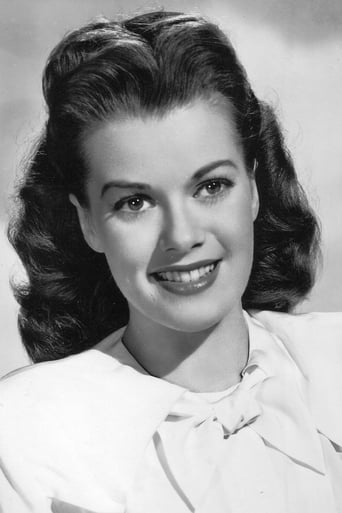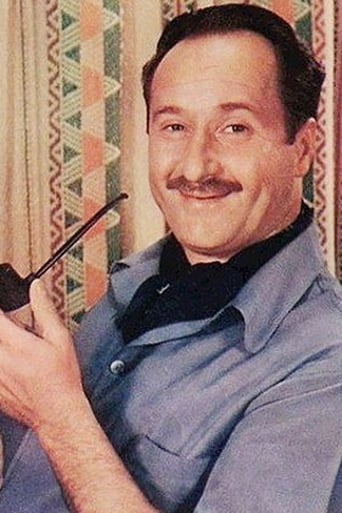TrueJoshNight
Truly Dreadful Film
Bardlerx
Strictly average movie
Patience Watson
One of those movie experiences that is so good it makes you realize you've been grading everything else on a curve.
Jenni Devyn
Worth seeing just to witness how winsome it is.
Martin Bradley
"Silk Stockings" isn't a great musical in the same way that "Ninotchka" was a great comedy, despite the Cole Porter score, but it is a sublime entertainment. The director was the great Rouben Mamoulian who was probably second only to Minnelli at this sort of thing, (in his use of color and widescreen or as the song says, 'Glorious Technicolor, Breathtaking Cinemascope and Stereophonic Sound'); consequently it looks great and thanks to the superb script from Leonard Gershe, Leonard Spigelgass and Harry Kurnitz, borrowing more than liberally from the original, it sounds great, too.Fundamentally, it's a vehicle for its leads. Fred Astaire may have been almost 60 at the time but you would hardly notice; he's still as nimble on his feet as he ever was. As an actress Cyd Charisse is no Garbo, (she wasn't much of a comedienne either), but she was a great partner for Astaire and a terrific dancer in her own right. Janis Paige is here too and is good enough to make you half wish she had been cast in the film version of "The Pajama Game", (as we all know she was passed over in favor of Doris Day). Peter Lorre, Jules Munshin and Joseph Buloff make up the Russian delegation and one of the joys of any musical is seeing Lorre supporting himself between a table and a chair during a Russian dance. Indeed the whole movie is something of a treat and if it sends you back to "Ninotchka" so much the better.
Applause Meter
Comparisons between this and the 1939 film "Ninotchka" are inevitable, but both films are entirely different genres and need to be evaluated on their own merits…or lack thereof. The 1939, Garbo-Douglas "Ninotchka" can be defined as a comedy/drama; the 1957, Astaire- Charisse "Silk Stockings" as a comedy/musical.Also… to those who find fault with the script as an unauthentic representation of Soviet citizenry circa the Cold War era… well…"Silk Stockings" is not meant to be a polemic on Communism, soviet style. It takes elements from Soviet life, exaggerates, and subverts the realities for comedic effect. We're talking comedy here, not documentary. Fred Astaire, as Hollywood producer Steve Canfield, here is an older Fred than we are used to seeing and although given star billing, the film is more of an ensemble effort. Cyd Charisse, as Ninotchhka, is tasked with playing a prudish, repressed, literal minded Soviet official. Ninotchhka, a personality manufactured by political propaganda is more of a one- dimensional caricature, a role that doesn't require great acting skill and Charisse manages her role with facility. Together Astaire and Charisse make a good dance team but the choreography is lackluster and pedestrian. Astaire at age 58 still demonstrates vitality but he's taking it easy here… nothing physically innovative or too rigorous. There's no Fred wow factor that would serve to add another jewel to the King of Dance's crown.Peter Lorre, one of a trio of Soviet commissars come to Paris to waylay a Russian composer's defection to Hollywood, diverges from his familiar portrayals. Formerly inseparable from characterizations of the sinister, sly insinuator here he's an engaging, chubby comrade/sidekick. Janis Paige was a ubiquitous, popular name in entertainment in the 1950s. She's the crass exhibitionist, Peggy Dayton, a concoction epitomizing the Hollywood star factory; she's a proxy for the over the top, gaudy commercialism of the Capitalist System. Her movie star is a manufactured product famous for showcasing her talents in the type of movie called water spectaculars, most commonly confined to swimming pools or sound stage sets mimicking exotic, fanciful lagoons. A not very flattering homage to Esther Williams...maybe?In "Silk Stockings" Cole Porter has given us song lyrics that seem forced, applied with a heavy- handed manipulation agonized over. The tunes are not memorable. Overall, there's a turgid gimmickry at work here, lacking the easy, almost effortless, sophisticated grace of his best work. This musical score is not representative of the best compositions in Porter's catalogue of memorable work. The most glaring bungling occurs in the cinematography and lightening. The camera work throughout is woefully uninspired, filmed predominately using medium shots, every scene is framed in a relentless monotony lacking visual variety. The unimaginative lightening only emphasizes the camera's deficiency further bathing everything in a uniform bright light, without nuance, shadow or mood. The result presents everything as if a flat page in a picture book. These "lazy" production values extend to the costumes and set décor as well where Technicolor is not used to advantage. The entire movie has a flat dullness, and drabness to it all. It might as well have been filmed in black and white. After finishing "Silk Stockings," Astaire didn't make another movie musical for ten years. After viewing the finished product, it's no mystery why he made that decision. All this being said… this is not the worst musical ever made, and can offer some entertainment value. Just sit back and enjoy the effortless charm and courtliness of Fred Astaire and the gorgeous Cyd Charise. What woman wouldn't want her figure and those beautiful, sculpted long legs?!
Steffi_P
Very few of the classic 1950s musicals were original stories. Most of them were musical adaptations of novels, stage plays or, increasingly, the previous generations' non-musical pictures. The quality of these often had little bearing on that of the original. The musical A Star is Born is for example considerably better than the original. But they could also be vastly worse than their predecessors after the rigours of plot rehash, singer-dancer casting and the conventions of a new era.The 1939 movie Ninotchka could only really have worked with Greta Garbo – it was built around her persona. Silk Stockings does not – and could not – have Garbo. Cyd Charisse is not a terrible actress, and even does a decent caricature of a steely soviet officer, speaking without moving a single other muscle in her face. Garbo on the other hand managed to get across the same idea without even such a trick as freezing up her face. She had something likable and beguiling about her even before her grim exterior was broken down. Charisse on the other hand succeeds only in presenting Ninotchka as totally robotic. That may be to her credit but it does not benefit the movie. Her transformation does not seem as plausible as Garbo's, and she is not especially human even after it.And this really seems to feed into all the other problems with Silk Stockings. With the Cold War and the McCarthy scare as a backdrop, there was no way the movie could be remotely equivocal about communism. As such the original story has lost a lot of its complexity, and a tone that was once playful now seems belligerent. Many of the lines seem unnecessarily dumbed-down (compare for example the language used by Garbo commenting on a fancy hat to the equivalent of Charisse and the stockings). There is a new subplot about a Russian composer having his music distorted for a screen musical, and there are a lot of attacks on ostentatious movie-making. But this is as simplistic as the politics, never going further than disdainfully listing the ills of modern Hollywood, as in the song "Stereophonic Sound".Presumably the studio didn't grasp the irony of these sentiments in a picture that was itself shot in Technicolor and cinemascope. Director Rouben Mamoulian probably did, apparently describing the new aspect ratio as "the stupidest shape I've ever seen". For a director usually at his most brilliant and inventive in the musical genre, his work is decidedly lacklustre here. The irony cannot have been lost on poor old Fred Astaire either, who is not at all well-served by 'scope. Either his feet are cut off at the bottom of the frame, or he seems lost amid all the other business on screen. It's a shame this was to be his last top-hat-and-tails performance. It's not exactly a noble send-off.There is one nice feature of Silk Stockings, and that is a sweet little performance by Peter Lorre. He's at his best here, all pent-up as if on the edge of a maniacal outburst. But the fact that this is the only laudable thing to say about the picture shows how generally dire the rest of it is. The Cole Porter songs are far from his best; weak rehashes of material from his earlier musicals. The second great irony about Silk Stockings is that, despite its waxing lyrical about the magic of true romance as opposed to bland analysis, the romance in the picture feels completely flat. It lacks all of the original movie's warmth and passion, not just in the love story but also in, say, the friendship between Ninotchka and the trio of Russian comrades. All in all, this is an atrocious movie.
samhill5215
For me this film has much I like. With Fred Astaire, Cyd Charisse, music, dancing, what more could one want? The music is catchy, jazzy, cool. The pace is good. The dancing numbers become progressively more complex, more energetic, the plot is OK (for a musical), and one can overlook Cyd Charisse's atrocious accent, but there was something lacking! By himself, Astaire was the master. His solo number on the club stage was fantastic. By herself, Cyd Charisse was spellbinding. Her solo number in her Moscow apartment was breathtaking. But together they just didn't zing like Astaire and Rogers did. When I watch musicals I do so for the dance numbers. I suspect I'm no different from most others. And when Fred and Ginger took the floor I didn't want it to end. They were that good! But with Fred and Cyd, the moves were excellent, there was that trademark single shot of the scene demanded by Astaire, everything was as it should have been except for chemistry. There just wasn't any. Compare that to the numbers Charisse danced with Ricardo Montalban in "Fiesta". In all fairness that shouldn't stop anyone from seeing this film. It's worth the price of admission for the solo numbers alone.








